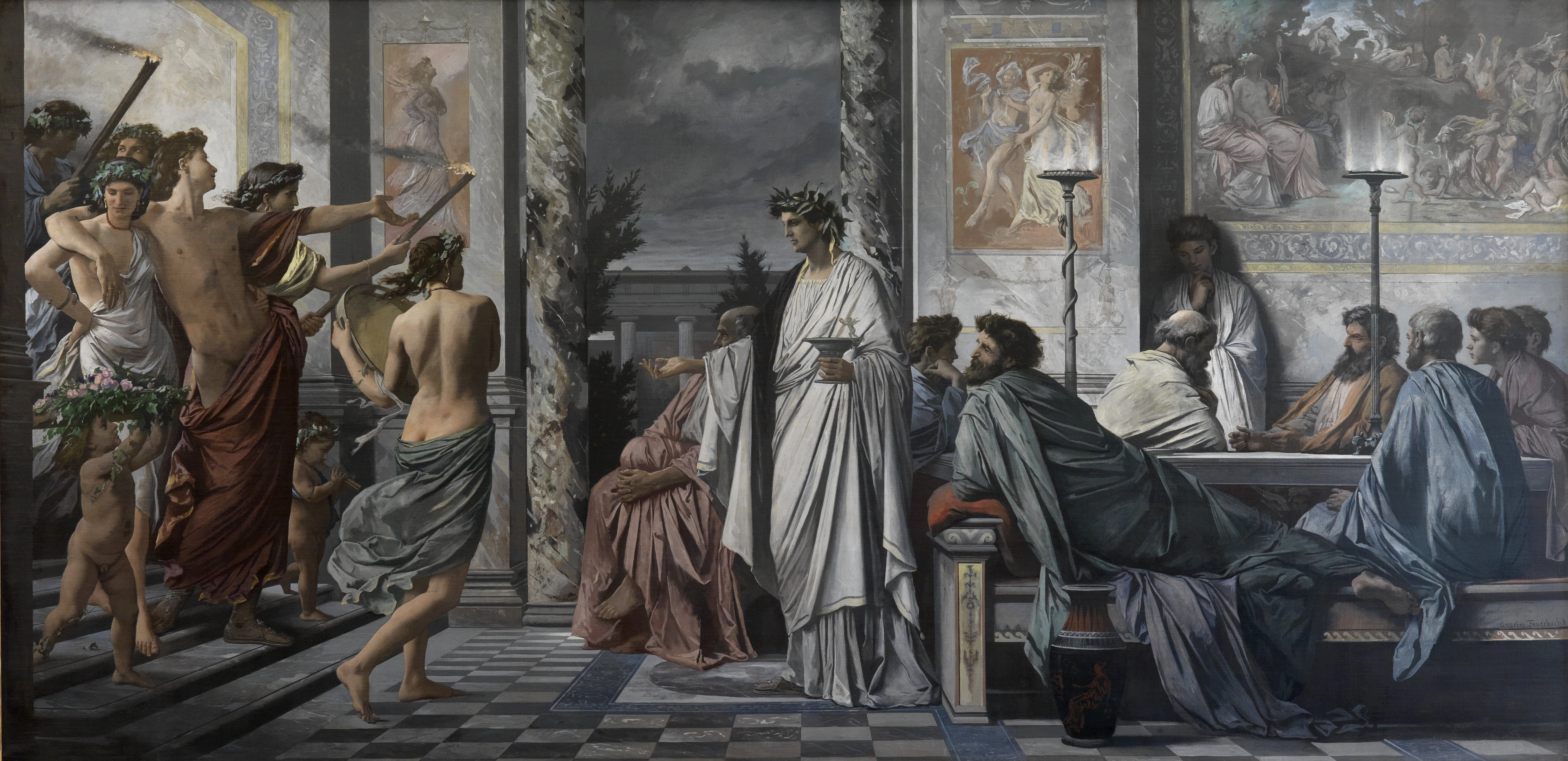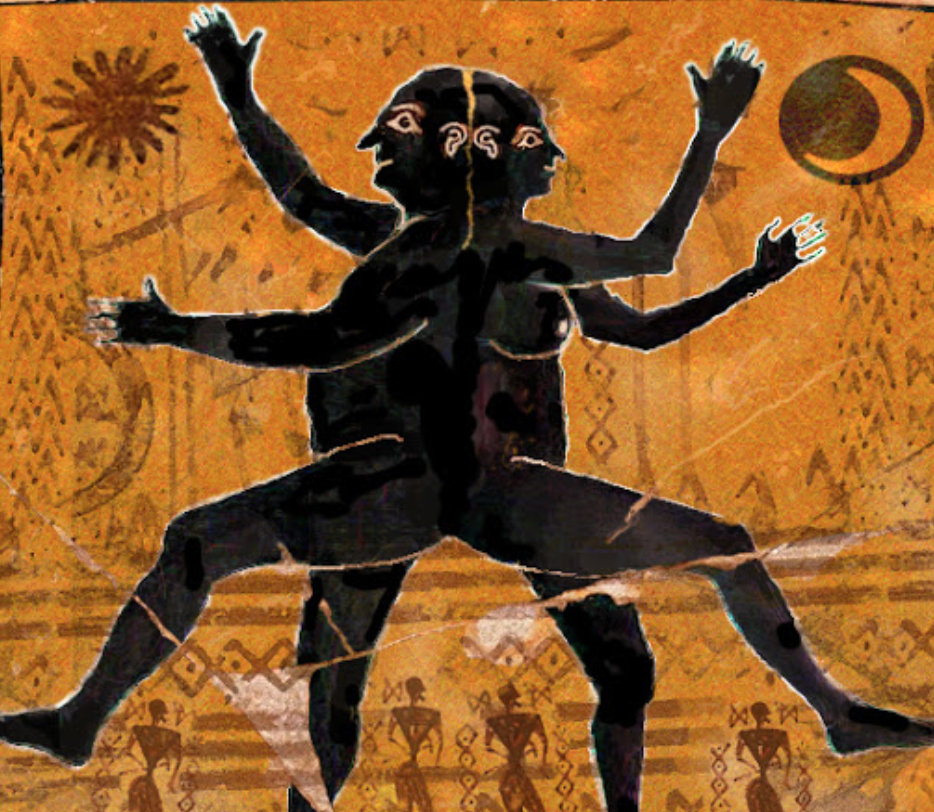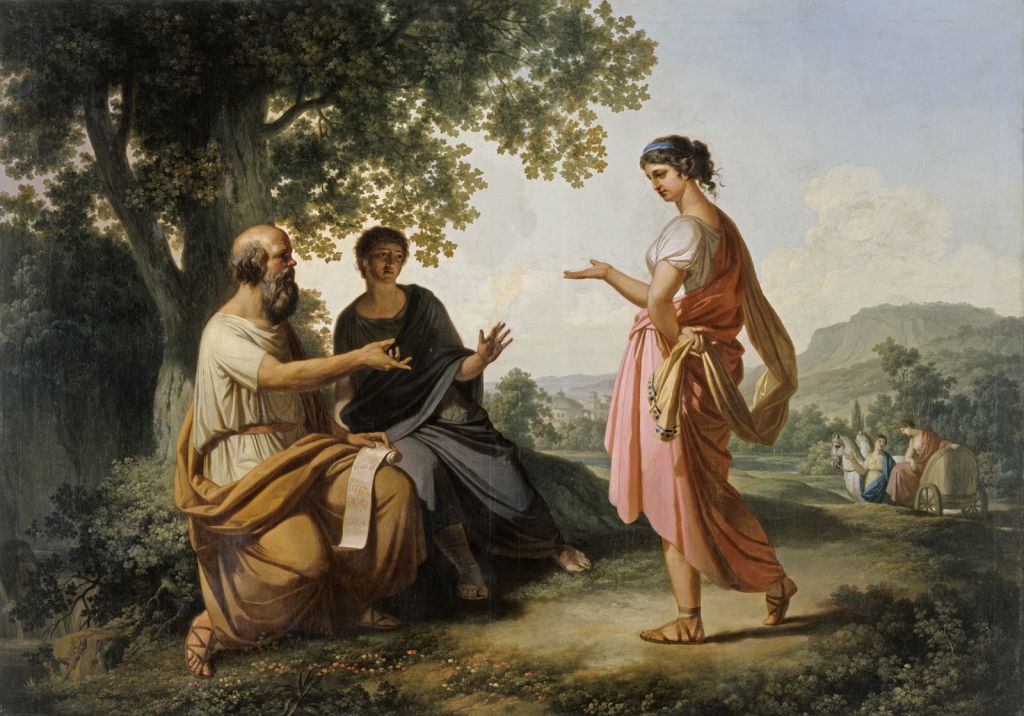
Introduction
The Symposium is essentially a conversation between “friends” from the upper class of Athens. This symposium consists of making eulogies about love, or as some participants would say, praising love as a god more specifically.
The setting of the Symposium is Agathon’s house.
An important cultural context about the symposium and Athenian society at the time: these gatherings were exclusively for upper-class men, and homosexuality was not only acceptable but often encouraged among men of this social class. Most of the symposium’s participants were involved in romantic relationships with other men - for instance, Socrates and Alcibiades, and Agathon and Pausanias (his lover).
I won’t talk about all the eulogies but just about the ones that most attracted me.
Phaedrus
There isn’t much that attracted me in the Phaedrus speech besides the whole idea that he presented, reminded me of the concept of partnership, and that’s what I understood about the Phaedrus speech.
He goes by saying a lover’s relationship brings one greater benefit that usually family and friends cannot bring with the same effectiveness, and that’s the difference between the relationships for him.
And what is this benefit? He basically says that (a very compressed summary), when you are in the presence of your lover, you get more courageous and you also get more afraid of committing moral mistakes, because you would be ashamed about what your lover would think about your shameful acts.
And regarding courage, one of the main things that Phaedrus talked about and gave some examples from Homer’s Odyssey is that lovers are prepared to die for each other, and for him that’s just very important. That’s like one of the big pieces of the benefits. And he even claims that a battalion on a battlefield made only of lovers would be one of the strongest battalions in the world, because all the soldiers there would be with full courage, they would die with each other. And they also would feel shame to drop their weapons in front of their loved ones, so they wouldn’t do that.
“For what lover would not choose rather to be seen by all mankind than by his beloved, either when abandoning his post or throwing away his arms? He would be ready to die a thousand deaths rather than endure this. Or who would desert his beloved or fail him in the hour of danger? The veriest coward would become an inspired hero, equal to the bravest, at such a time; Eros would inspire him. That courage which, as Homer says, the god breathes into the souls of some heroes, Eros of his own nature infuses into the lover.”
And that’s it for me - the courage, the will to die for each other, the avoidance of shameful acts…
It is all about a partnership that lovers built. And that’s it.
Partnership between two humans on living a better life together, keeping each other safe and virtuous.
Aristophanes
The Aristophanes eulogy was very fictional for me, and the reason I’m mentioning his speech is just because I really loved the way he built his argument - it was very beautiful for me.
So what exactly did Aristophanes describe in his eulogy? He starts saying that from the beginning of the human race we were a different being, a being with four legs, four arms, two faces and two genitals. We were practically two people in the same body.

He claims that these people, which were the human race in the beginning, were so strong that they were trying to, at least a part of them, have physical conflicts with the gods, with Zeus, and they were very strong. Zeus didn’t like that and to solve this problem, because they were too strong and Zeus didn’t want to erase the human race from the earth, so to keep the human race alive and to increase the number of followers of gods, he split the human beings in two.
These new human beings after splitting now each had, as we have now, two legs, two arms, one face, one genital. It is like what we know about a person today.
And where is love on his eulogy?
For Aristophanes, love is about humans looking to complete their other half, their other half which was lost when we all got split in two.
‘Do you desire to be wholly one; always day and night to be in one another’s company? For if this is what you desire, I am ready to melt you into one and let you grow together, so that being two you shall become one, and while you live, live a common life as if you were a single person, and after your death in the world below still be one departed soul instead of two, I ask whether this is what you lovingly desire, and whether you are satisfied to attain this?’ There is not a one of them who when he heard the proposal would deny or would not acknowledge that this meeting and melting into one another, this becoming one instead of two, was the very expression of his ancient need. And the reason is that human nature was originally one and we were a whole, and the desire and pursuit of the whole is called love.
That’s what love is for Aristophanes.
His “fiction” was simply poetically beautiful, elegant and romantic for me.
Socrates
The Socrates eulogy is the best part of the book, I mean the more serious one because it is the more rational in my opinion, and he was really good at describing love.
Unfortunately, I won’t have the time to this date to really dive deeper on this eulogy and give a complete description of my thoughts on this eulogy because I have some other things to do.
Just to give you a glimpse of what his speech was about: first, he talks about desire - love is desire. Actually, it was related to the previous eulogy (Agathon’s) that I didn’t mention. Agathon talks about desire and etc.
Socrates seems to agree but he claims that desire is about something that someone lacks, and if someone loves something, this someone lacks this something.
And later he also talks about beauty - if love pursues beauty, and why love is desiring beautiful things.
Then he starts to talk about a woman called Diotima who was the one that taught him about the ways of love, and he starts to transcribe the dialogue that he had with her. It seems the historical existence of this person is not something that everyone agrees on - some people claim that Diotima was a persona created by Socrates.

Anyway, Diotima says that love is not actually a god as all the others were trying to bring before - gods are all attractive and they do not desire anything because they already have, they are already perfect, they have everything that they want, they do not desire wisdom or beauty because they already have that. So love is not a god and neither is a human, so for Diotima love is between human and God, it is a spirit.
Later, they arrive at the conclusion that the object of love is the permanent possession of goodness for oneself.
“… the object of love is the permanent possession of goodness for oneself.” - Diotima
“the object of love is not beauty, as you imagine… It is birth and procreation in a beatiful medium.” - Diotima
“Why procreation? Because procreation is as close as a mortal can get to being immortal and undying” - Diotima
It is not only about romantic-sexual relationships between two people. That’s not the only object of love - it is one of them. Love is… the object of love is anything that you can achieve goodness for yourself. And that’s again, it is not necessarily another person as in marriage or something like that, as in a romantic relationship.
Also, this is the love - the object of love is also birth and procreation in a beautiful medium. And here birth and procreation is not only about sex again and giving birth to children, but it is also the creation of art, of engineering things… There are simply things that provide goodness or something like that in a way.
The final conclusion is that after someone goes through the ways of love and knows what love is about, they stop looking for love in things and in other people. They start to stop doing that and instead, they find an eternal love not anywhere else and not in other people, but they find this eternal love within itself.
“… because anyone who has been guided and trained in the ways of love up to this point, who has viewed things of beauty in the proper order and manner, will now approach the culmination of love’s ways and will suddenly catch sight of something of unbelievable beauty—something, Socrates, which in fact gives meaning to all his previous efforts. What he’ll see is, in the first place, eternal; it doesn’t come to be or cease to be, and it doesn’t increase or diminish. In the second place, it isn’t attractive in one respect and repulsive in another, or attractive at one time but not at another, or attractive in one setting but repulsive in another, or attractive here and repulsive elsewhere, depending on how people find it. Then again, he won’t perceive beauty as a face or hands or any other physical feature, or as a piece of reasoning or knowledge, and he won’t perceive it as being anywhere else either—in something like a creature or the earth or the heavens. No, he’ll perceive it in itself and by itself, constant and eternal, and he’ll see b that every other beautiful object somehow partakes of it, but in such a way that their coming to be and ceasing to be don’t increase or diminish it at all, and it remains entirely unaffected." - Diotima
And that’s simply the most beautiful thing that I saw in this book.
I may get back and read the Socrats eulogy again and dive on it further and write a blog post only for it.
Broooo, the ending… LOL
What was this ending? hahahahah
There was a street-drunk party happening outside of the house (Agathon’s house I guess) where the Symposium was happening, when a guy called Alcibiades (who was friends with the others), coming from the party very drunk, asked if he could participate in the Symposium.
Until then, everything is quite normal. But things started to get very comic with him, and I’ll tell you why:
Context: Socrates was Alcibiades’s lover.
Everyone had already given their discourse on love. However, they asked for Alcibiades’s opinion on love. Alcibiades in turn said he would do an eulogy about Socrates himself.
Long story short, Alcibiades eulogy started with a lot of loathe towards Socrates.
Claiming that Socrates was alike to Satyrs in both appearance and personality.
Bla, bla, bla, a lot of hatred in his discourse…
Followed by a lot of admiration for Socrates.
It was really a mixture of emotions towards the shoeless man. Love, hatred, admiration…
But why so much hate towards Socrates?
…
I won’t give you spoilers, just read it. It’ll be worth the laughs.
Anyway, I was not expecting for a Plato book to be that funny :)